TALIS Bundle
How is TALIS Company Navigating the Future of Water Infrastructure?
The water and wastewater industry is experiencing unprecedented growth, driven by global challenges and increasing demands. TALIS SWOT Analysis reveals how companies like TALIS are adapting to these shifts. Understanding TALIS's growth strategy is crucial for anyone interested in the future of sustainable infrastructure.
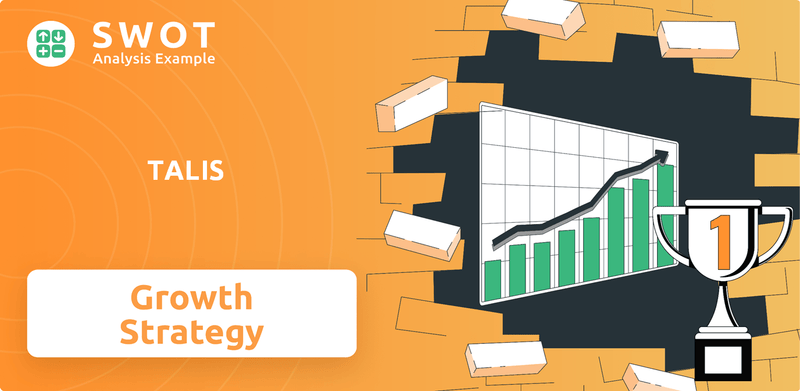
This analysis explores the TALIS Company's strategic approach to capitalizing on these opportunities. We'll delve into TALIS Future Prospects, examining its Growth Strategy through TALIS Market Analysis and TALIS Expansion Plans. This includes an examination of TALIS Business strategies, providing insights into its competitive landscape and long-term vision within the evolving water management sector.
How Is TALIS Expanding Its Reach?
The recent expansion initiatives of TALIS Company are focused on strengthening its global presence and broadening its product offerings within the water and wastewater infrastructure sector. A key development in this strategy was the acquisition of the remaining part of the Talis Group by AVK at the beginning of 2024. This strategic move included companies like Bayard (France) and Belgicast (Spain), along with their subsidiaries in Italy, Portugal, and China. This acquisition significantly bolstered AVK's Water business unit, particularly in Southern Europe and the desalination market.
This acquisition reflects a strategic approach of acquiring established players to gain access to new product ranges and market positions. While specific timelines for future product launches or detailed partnership strategies for TALIS (as a standalone entity, given the recent acquisition by AVK) are not publicly detailed, the broader industry trend points towards continued international expansion, especially in emerging economies. The focus is shifting towards providing comprehensive solutions rather than just individual components.
The water and wastewater infrastructure market is experiencing steady growth, driven by factors like increasing urbanization, population growth, and the need for efficient water management. According to a report by Global Market Insights, the global water and wastewater treatment market was valued at over $750 billion in 2023 and is projected to exceed $1 trillion by 2032. This growth underscores the potential for TALIS Company and similar entities to expand their market share through strategic initiatives.
The acquisition of the Talis Group by AVK, including Bayard and Belgicast, is a clear example of expansion into new markets. This move strengthens the company's presence in Southern Europe and China. Expansion also includes focusing on comprehensive solutions.
Acquiring companies with established product lines allows for diversification of offerings. This approach helps in catering to a broader range of customer needs. It also enhances the company's ability to provide complete water infrastructure solutions.
While specific partnership strategies are not publicly detailed, the industry trend suggests a focus on collaborations. These partnerships could involve technology providers, local distributors, and other industry players. Such collaborations can facilitate market entry and enhance competitiveness.
The water and wastewater industry is increasingly adopting advanced technologies. These include smart water management systems, IoT-enabled solutions, and advanced filtration technologies. Investment in these areas can drive innovation and improve operational efficiency.
The future prospects for TALIS Company are closely tied to its ability to adapt to market changes and capitalize on growth opportunities. The company's strategic goals include expanding into new markets and enhancing its technological capabilities. The company's focus on sustainability initiatives and customer acquisition strategies will also play a crucial role in its long-term growth.
- International Expansion: Continued growth in emerging markets, particularly in Asia-Pacific and Latin America.
- Technological Innovation: Development of smart water solutions and advanced filtration technologies.
- Sustainability: Focus on eco-friendly products and solutions to meet environmental regulations.
- Customer Focus: Strengthening relationships with existing customers and acquiring new ones through targeted strategies.
TALIS SWOT Analysis
- Complete SWOT Breakdown
- Fully Customizable
- Editable in Excel & Word
- Professional Formatting
- Investor-Ready Format
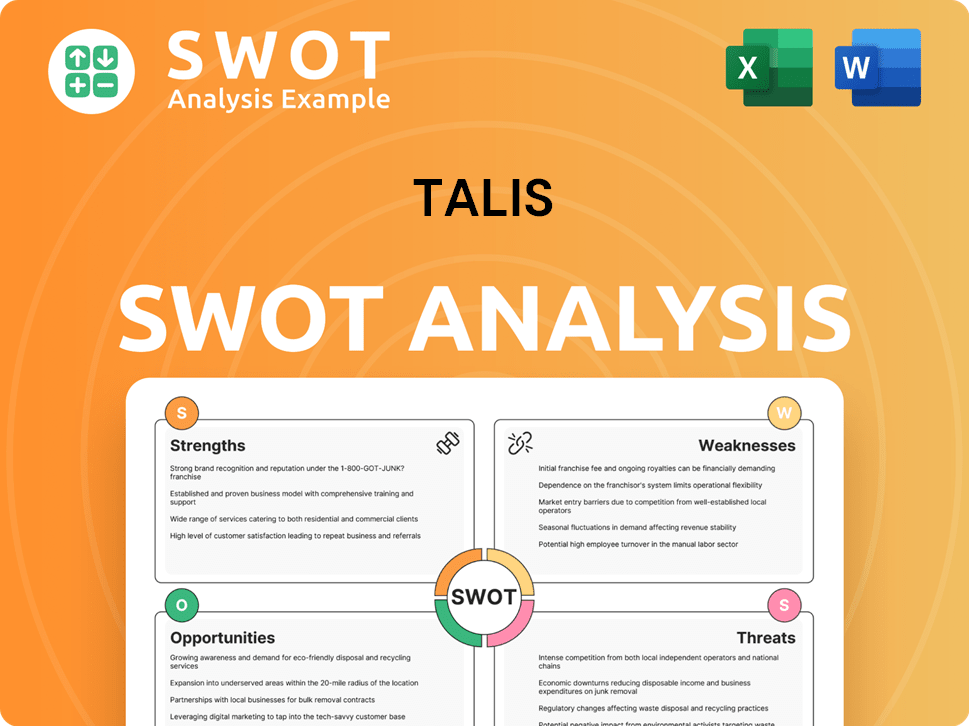
How Does TALIS Invest in Innovation?
The focus of the company, as a key player in water infrastructure, is on developing innovative and sustainable technologies for the water industry. This commitment is crucial given the evolving regulatory landscape and the increasing demand for efficient water management solutions. The company's approach to innovation will likely be shaped by the need to meet stringent environmental standards and enhance operational efficiencies.
The broader water sector is experiencing significant regulatory developments, which directly influence the company's strategic direction. These changes, such as the Water (Special Measures) Act 2025, which received Royal Assent on February 24, 2025, emphasize the need for advanced technologies and environmentally friendly solutions within drainage and sewerage networks. This creates both challenges and opportunities for the company.
While specific details on the company's in-house R&D investments, key patents, or industry awards are not readily available in the provided search results, the company's stated focus on innovative and sustainable technologies suggests an ongoing commitment to leveraging advancements like automation, potentially AI and IoT, to enhance its product offerings and contribute to growth objectives within a highly regulated and evolving industry.
The company's growth strategy hinges on strategic investments in research and development. These investments are critical for staying ahead of technological advancements and meeting evolving market demands. The company likely allocates a significant portion of its resources to R&D to ensure it remains competitive.
The company is likely exploring cutting-edge technologies such as AI, IoT, and automation to enhance its product offerings. These advancements can improve efficiency, reduce costs, and provide better services. The integration of these technologies is key to the company's future success.
Sustainability is a core focus, driving the company's innovation efforts. The company is likely developing eco-friendly products and solutions to meet regulatory requirements and customer expectations. This commitment to sustainability is essential for long-term growth.
The company must adapt to market changes, including new regulations and evolving customer needs. This adaptability requires continuous innovation and a proactive approach to market analysis. Understanding the competitive landscape is also crucial.
The company's strategies for customer acquisition are likely focused on providing superior products and services. This includes building strong relationships with clients and understanding their specific needs. Effective customer acquisition is crucial for expanding its market share.
The company may be considering expansion into new markets to fuel its growth. This could involve entering new geographic regions or targeting different segments within the water infrastructure industry. Strategic market analysis is key to successful expansion.
The company's growth is driven by several factors, including technological innovation, regulatory changes, and market demand. The company faces challenges such as competition, economic conditions, and the need to maintain a sustainable business model. For more insights into the company's structure, consider exploring Owners & Shareholders of TALIS.
- Innovation: Continuous investment in R&D to develop advanced water infrastructure solutions.
- Regulatory Compliance: Adapting to new regulations and standards, such as the Water (Special Measures) Act 2025.
- Market Expansion: Exploring new markets and customer segments to increase revenue and market share.
- Sustainability: Developing eco-friendly products and solutions to meet environmental standards.
- Competitive Landscape: Addressing competition from other companies in the water infrastructure sector.
TALIS PESTLE Analysis
- Covers All 6 PESTLE Categories
- No Research Needed – Save Hours of Work
- Built by Experts, Trusted by Consultants
- Instant Download, Ready to Use
- 100% Editable, Fully Customizable
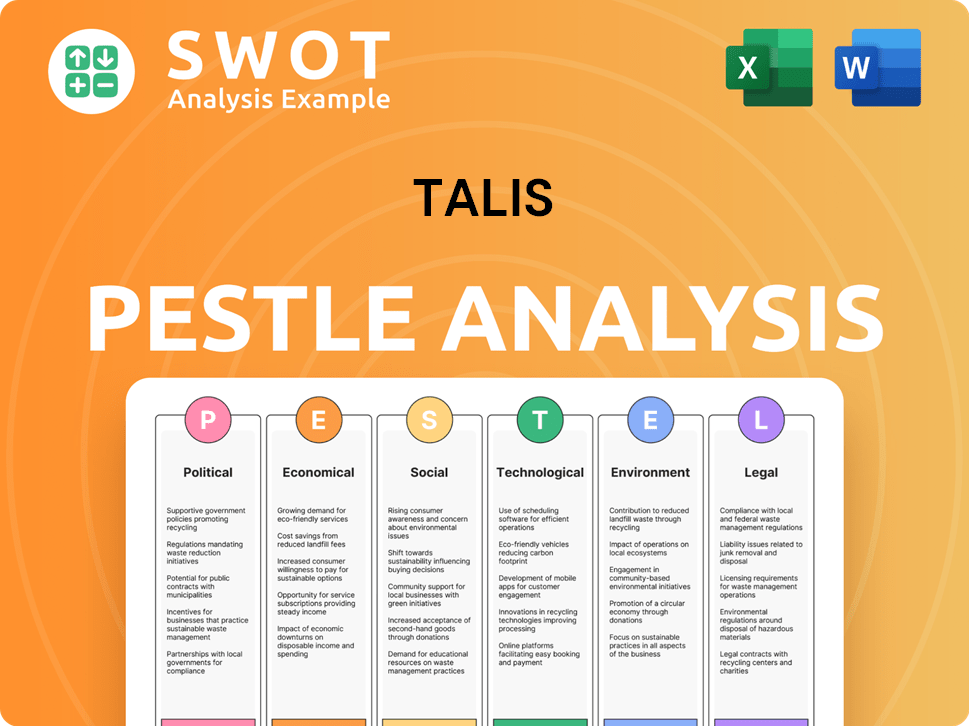
What Is TALIS’s Growth Forecast?
Since the full acquisition of the TALIS Group by AVK in early 2024, the financial performance of TALIS is now reported within AVK's consolidated results. This integration provides a broader financial picture, reflecting the combined strength and strategic alignment of both entities. This shift is crucial for understanding the current financial outlook and future prospects of the TALIS Company.
In the fiscal year 2023/24, AVK experienced significant financial growth, largely influenced by the inclusion of TALIS. The acquisition has strategically positioned AVK to capitalize on market opportunities and enhance its overall market presence. This integration is expected to drive further growth and strengthen the company's position in the water infrastructure market.
AVK's net sales for 2023/24 reached DKK 9.0 billion, marking a substantial increase of 13.7% compared to the previous year. This growth was significantly bolstered by the integration of acquired companies, including parts of TALIS. Organic growth, excluding acquisitions, stood at 1.3%, indicating a solid underlying performance. The financial data underscores the positive impact of the TALIS acquisition on AVK's revenue streams and overall financial health.
AVK Water, a business unit strengthened by the TALIS acquisition, achieved a remarkable 28% growth rate. This growth was driven by strong sales in key regions such as the Middle East, the UK, and the United States. This expansion reflects the successful integration of TALIS's operations and market strategies.
The operating profit for AVK amounted to DKK 871 million, representing a 12.4% increase from the previous year. Despite ongoing growth initiatives, the operating margin was maintained, demonstrating efficient cost management and operational effectiveness. This stability is crucial for the TALIS Business's long-term sustainability.
AVK maintained a high level of investment, primarily focused on capacity expansion, factory upgrades, automation, and product development. These investments are crucial for supporting future TALIS Expansion Plans and ensuring the company remains competitive in the market.
The financial data indicates that the integration of TALIS into AVK is positively impacting AVK's overall financial performance and growth trajectory. This strategic alignment is expected to enhance TALIS Market Analysis and drive further success.
TALIS Business Model Canvas
- Complete 9-Block Business Model Canvas
- Effortlessly Communicate Your Business Strategy
- Investor-Ready BMC Format
- 100% Editable and Customizable
- Clear and Structured Layout
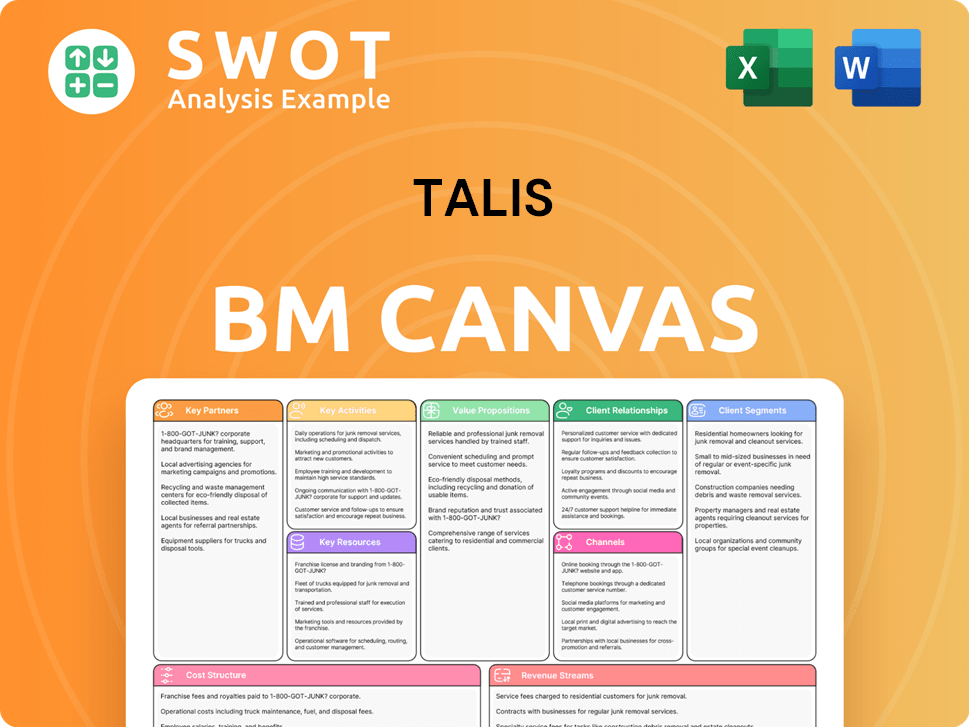
What Risks Could Slow TALIS’s Growth?
The water and wastewater infrastructure sector, and consequently, the TALIS Company faces several potential risks and obstacles that could influence its Growth Strategy and TALIS Future Prospects. These challenges include market competition, regulatory changes, supply chain vulnerabilities, technological disruptions, and internal resource constraints. A proactive approach to risk management and strategic planning is essential for sustainable growth within this dynamic environment.
Regulatory shifts, such as the Water (Special Measures) Act 2025 in the UK, can increase operational costs and compliance burdens, impacting profitability. Public scrutiny regarding infrastructure investment and pollution incidents further complicates the landscape. Addressing these issues requires a comprehensive strategy to navigate the complexities of the industry.
Internal factors, such as a shortage of skilled labor or insufficient investment in R&D, could hinder TALIS Business expansion. External challenges like supply chain disruptions and technological advancements also pose significant threats. The ability to adapt and innovate is crucial for maintaining a competitive edge. For more insights on the company's background, you can refer to the Brief History of TALIS.
The water and wastewater industry is highly competitive, with numerous established and emerging players. This competition can affect TALIS Market Analysis, influencing market share and pricing strategies. Continuous innovation and differentiation are crucial for maintaining a competitive advantage in the TALIS Business.
Regulatory changes, such as the Water (Special Measures) Act 2025, introduce stricter accountability for water companies. These regulations can lead to higher operational costs and compliance burdens. Adapting to these changes is essential for long-term sustainability and compliance with environmental standards.
Supply chain disruptions, particularly in a globalized environment, can affect production and delivery schedules. These vulnerabilities highlight the need for robust supply chain management and diversification. Mitigating these risks is essential for ensuring operational efficiency and meeting customer demands.
Technological advancements can disrupt the industry, posing a risk if a company fails to adapt quickly. Embracing innovation and investing in research and development are vital for staying competitive. Failure to adapt can lead to a loss of market share and reduced profitability.
Internal resource constraints, such as a shortage of skilled labor or insufficient investment in R&D, can hinder growth. Addressing these constraints requires strategic workforce planning and investment in innovation. Effective resource management is crucial for achieving TALIS Expansion Plans.
Public concerns regarding underinvestment in infrastructure and pollution incidents can negatively impact the industry. The Environment Agency in the UK reported an increase in serious pollution incidents to 47 in 2023, up from 44 in 2022. Addressing these concerns requires transparency and proactive environmental stewardship.
TALIS Company must continually monitor market trends and competitor activities. Understanding market dynamics is critical for effective strategic planning. Detailed TALIS Market Analysis will provide insights into potential areas for growth and investment.
Compliance with environmental regulations is a significant factor. The Water (Special Measures) Act 2025, for example, mandates stricter environmental performance standards. Investments in sustainable practices and technologies are essential for meeting these standards.
Diversifying the supply chain and building strong supplier relationships are crucial. This approach can mitigate risks associated with disruptions. Effective supply chain management ensures the timely availability of necessary resources.
Investing in research and development is essential for adapting to technological changes. Staying ahead of the curve requires a commitment to innovation. TALIS Company must foster a culture of adaptability to remain competitive.
TALIS Porter's Five Forces Analysis
- Covers All 5 Competitive Forces in Detail
- Structured for Consultants, Students, and Founders
- 100% Editable in Microsoft Word & Excel
- Instant Digital Download – Use Immediately
- Compatible with Mac & PC – Fully Unlocked
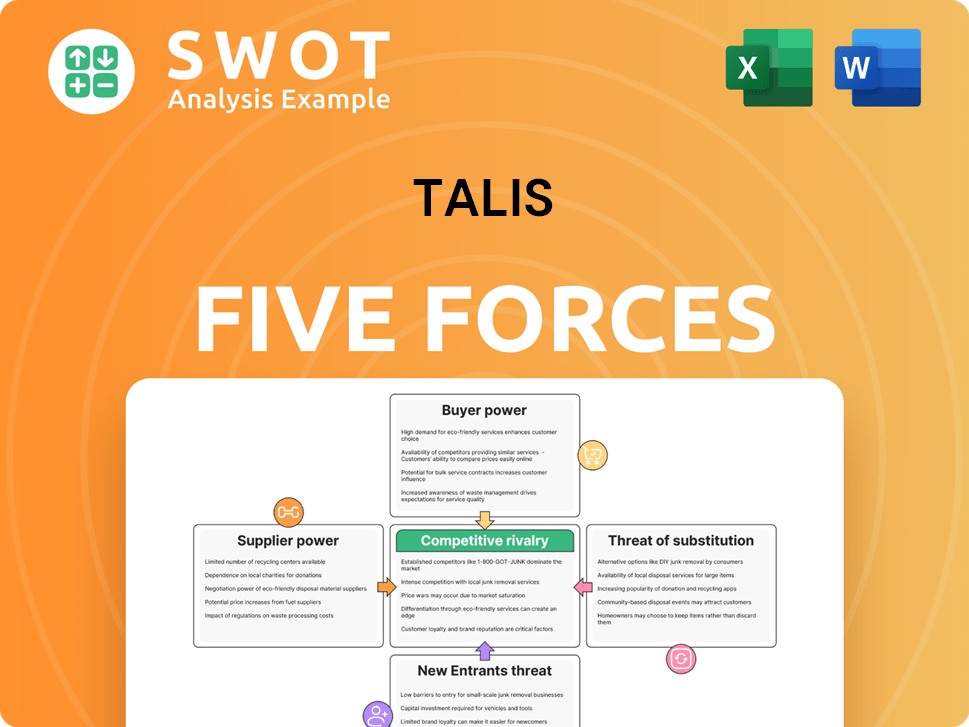
Related Blogs
- What are Mission Vision & Core Values of TALIS Company?
- What is Competitive Landscape of TALIS Company?
- How Does TALIS Company Work?
- What is Sales and Marketing Strategy of TALIS Company?
- What is Brief History of TALIS Company?
- Who Owns TALIS Company?
- What is Customer Demographics and Target Market of TALIS Company?
Disclaimer
All information, articles, and product details provided on this website are for general informational and educational purposes only. We do not claim any ownership over, nor do we intend to infringe upon, any trademarks, copyrights, logos, brand names, or other intellectual property mentioned or depicted on this site. Such intellectual property remains the property of its respective owners, and any references here are made solely for identification or informational purposes, without implying any affiliation, endorsement, or partnership.
We make no representations or warranties, express or implied, regarding the accuracy, completeness, or suitability of any content or products presented. Nothing on this website should be construed as legal, tax, investment, financial, medical, or other professional advice. In addition, no part of this site—including articles or product references—constitutes a solicitation, recommendation, endorsement, advertisement, or offer to buy or sell any securities, franchises, or other financial instruments, particularly in jurisdictions where such activity would be unlawful.
All content is of a general nature and may not address the specific circumstances of any individual or entity. It is not a substitute for professional advice or services. Any actions you take based on the information provided here are strictly at your own risk. You accept full responsibility for any decisions or outcomes arising from your use of this website and agree to release us from any liability in connection with your use of, or reliance upon, the content or products found herein.